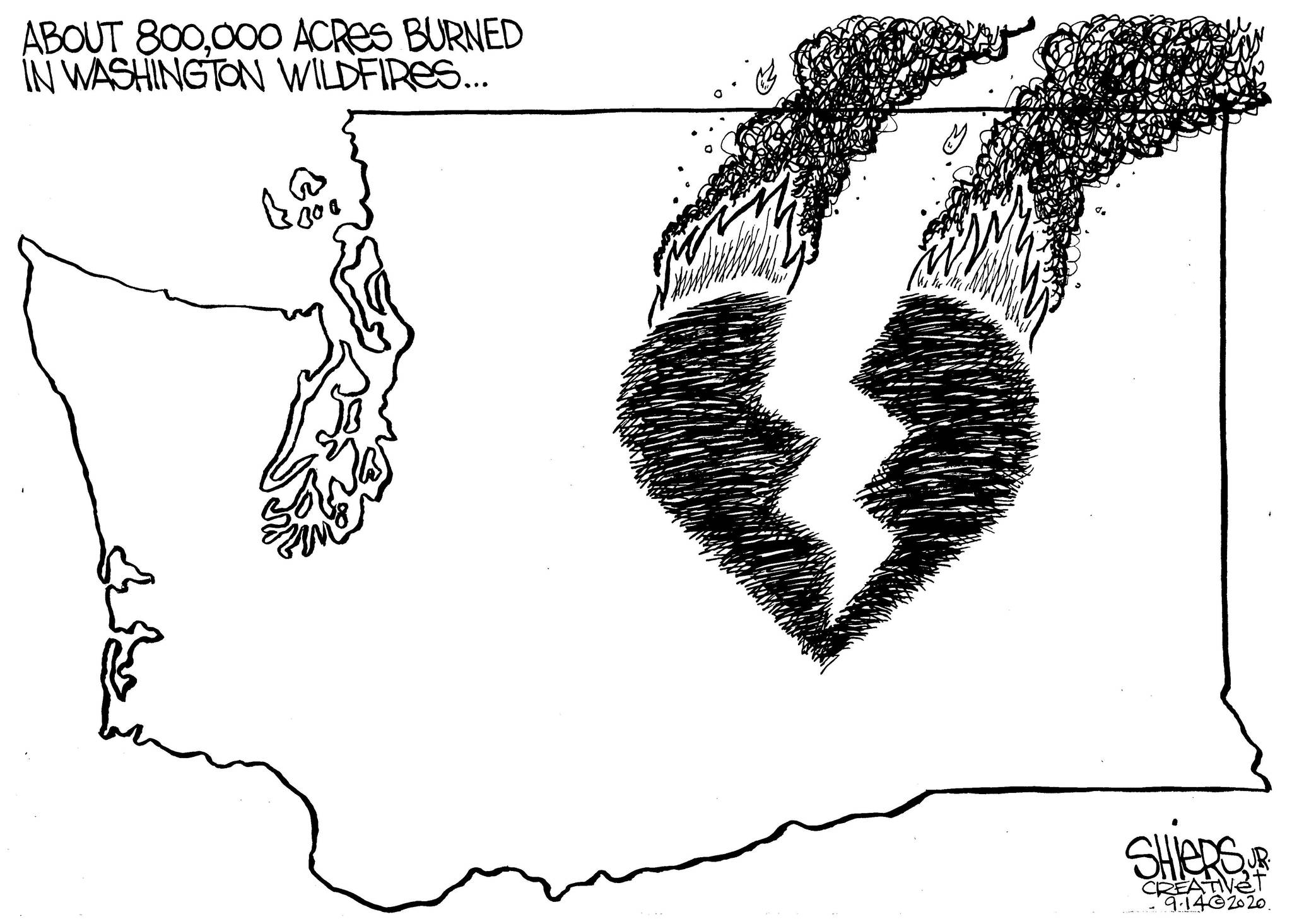Let’s clear the air. Please.
That’s meant in two senses: Coming to agreement on steps we have to take, then taking those steps that can help to literally clear the air:
Of the wildfire smoke that darkened our skylines and seeped into our homes for nearly two weeks;
And of the greenhouse gases we live with year-round that, while less noticeable, are still unhealthful and are responsible for global climate change.
The wildfires, in fact, have illustrated the difference of opinion that many have regarding what’s responsible for the fires, their damage to property, cost in lives and the unhealthy levels of pollution that many now are monitoring on their smartphones. The latest political divide is now between those who blame climate change and those who fault poor management of public and private forestlands.
But it’s not one or the other, said Vlad Guttman-Britten, Washington director for Climate Solutions, a nonprofit clean-energy advocacy group.
“The reason we see these fires is because of climate and poor forest management practices and because the two of them add up to more than the sum of their parts,” Guttman-Britten said.
The wildfire seasons in Washington state and the rest of the West are lengthening and the fires are increasing in their frequency and destruction, with climate change driving hot, dry conditions that turn poorly managed forestlands — some with diseased and dead trees — into tinderboxes.
Wildfires in Washington state consumed more than 1.1 million acres in 2015, setting a record for loss, including the deaths of three firefighters. Already this season, more than 620,000 acres have burned, much of it exploding just since Labor Day, both in Eastern and Western Washington. A one-year-old boy, whose Renton parents were attempting to flee the Cold Springs fire in Central Washington, died Sept. 8; the parents were hospitalized in critical condition with third-degree burns.
Likewise, the summer of 2018 set a 20-year record, since the Puget Sound Clean Air Agency began keeping records, for the number of days of unhealthy levels of smoke in Western Washington; we’ve now surpassed that mark this year.
That’s a diagnosis confirmed by Dr. Amy Markezich, a pulmonology critical care specialist at Bellevue’s Overlake Medical Center and works with Washington Physicians for Social Responsibility, a physician-led advocacy organization.
“This is definitely worse that two years ago,” Markezich said, with the wildfire smoke posing dire risks for those with lung conditions, such as asthma, chronic obstructive pulmonary disease (COPD) and those at increased risk of heart disease and stroke.
In addition to those with pre-existing conditions, she said, the smoke also poses a threat to those who work outdoors — some at lower-paying jobs — in agriculture, landscaping, construction and other essential work.
Even those who don’t work outside but live near transportation corridors and in urban areas are exposed to the combined threat of the wildfire smoke and the baseline pollution from auto emissions, said Robin Engle with OneAmerica, with weather conditions holding a lid on the mix of pollutants over cities. That concern, Engle said, points to the need for immediate remedies to address the smoke, including a system of emergency announcements, translated in several languages, that advise preventive measures to protect health.
Short-term and long-term measures are necessary now to address wildfires and climate change.
Regarding wildfires, work in Washington state is progressing to address fire suppression and prevention and forest health, under the leadership of state Public Lands Commissioner Hilary Franz, who heads the state Department of Natural Resources, and funding increased in 2019 by state lawmakers. At Franz’s request, the Legislature provided $50 million in funding that has been used to hire more DNR firefighters, replace fire trucks and helicopters, assist fire-prone communities in limiting risks to homes and properties and work to improve the health of forests through thinning and prescribed burns.
Congress, too, has passed legislation in recent years that established a $2 billion contingency account intended to end the practice of borrowing money to fight fires from funds intended to improve forest management, fire prevention and fuels reduction.
There’s been similar advances on the environment and climate change by state lawmakers. The Legislature’s 2019 session saw adoption of an impressive raft of environmental legislation, including the creation of a clean-energy standard that will require all electricity to be greenhouse gas-neutral by 2030, and for all utilities to provide 100 percent of electrical power from non-carbon and renewable sources by 2045.
What the Legislature — and the voters — have struggled with have been more far-reaching measures, including a clean-fuels standard and policies that put a price on carbon. A clean-fuels standard would require a reduction in greenhouse gases from gasoline and diesel. Carbon pricing would establish a tax on greenhouse gases or set a cap-and-trade policy.
Both are important next steps, said Guttman-Britten and Rich Stoltz, executive director for One America in reducing the threat of wildfires and climate change.
“The only way to get a shot at preventing this from being the new normal every summer is to begin to pass significant policies that reduce emissions in a really meaningful way,” Stoltz said.
Beyond the responsibilities of national, state and local officials to take action on forest management and climate change, however, rests the duty of voters this November.
Progress on these issues isn’t wholly dependent on who sits in the Oval Office, but President Trump has shown an inability and an unwillingness throughout his term to acknowledge with any serious conviction the threats of wildfires, other natural disasters and climate change, insisting recently, “that science doesn’t know.”
The president is an obstruction to fair consideration of these issues and to progress on confronting them. Joe Biden will provide far better leadership on climate changes, its costs and its solutions.
Vote, and clear the air.



